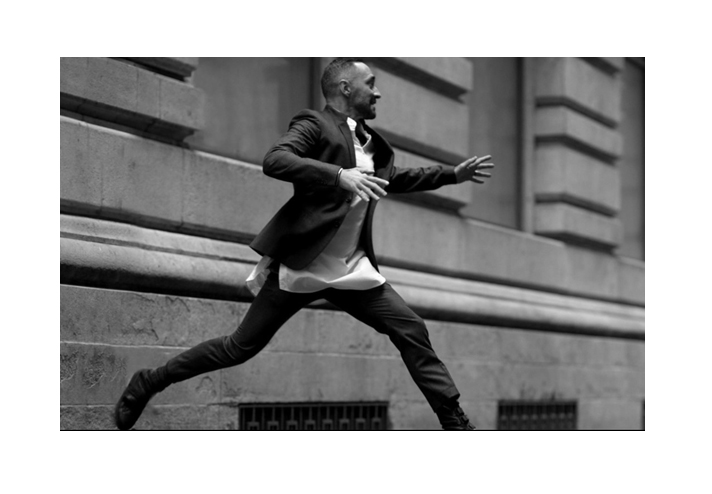Swing Time: Theo Bleckmann

In the midst of one of the most turbulent times in modern American history, the German-born vocalist and composer pairs songs of resistance with songs of refuge on his new set with The Westerlies.
It’s become de rigueur, when writing about vocalist/ composer Theo Bleckmann, to resort to familiar tags like “genre-busting” and “eclectic,” but those adjectives simply don’t do him justice. Bleckmann exists in a world of his own creation: Over a career that now extends beyond the quarter-century mark, the artist has applied his prodigious skills not only to his own compositions but also to interpretations of Kate Bush’s catalog, Las Vegas lounge music, Mother Goose rhymes and even an operatic treatment of the story of gangster Dutch Schultz. He has teamed with a wildly diverse list of collaborators associated with jazz, contemporary classical and unclassifiable experimental music on numerous multidisciplinary projects. Critics have praised Bleckmann’s flawless technique, improvisatory acumen and richly emotive style—he doesn’t merely use his voice as an instrument; he becomes an instrument.
This Land, Bleckmann’s new collaborative work with the brass quartet The Westerlies, may be his most potent and important project to date. Featuring original compositions by Bleckmann and members of the group— as well as interpretations of songs by Woody Guthrie, Joni Mitchell, Bertolt Brecht and others—the album, according to its program notes, “pair[s] songs of resistance with songs of refuge, seeking to balance music’s integral role in protest movements with the power of songs to provide internal solace amidst external turmoil.”
The project had its genesis during an initial 2016 session and continued during a 2018 Vermont residence that paired Bleckmann with The Westerlies: trombonists Andy Clausen and Willem de Koch, and trumpeters Riley Mulherkar and Chloe Rowlands. “We just felt like this was the time to change the subject matter of music a little bit,” says Bleckmann, 54, who was born in Germany but has long lived in the States. “We started to collect music and write music with that in mind, using our artistry to preach to the choir so that the choir members can then preach to their families.”
“We approached the process thinking we were going to come up with a set of protest songs, but what emerged was something more honest for us, yet harder to articulate: a mix of rage, satire, humor, love and sorrow through the tools that we have,” Mulherkar says. “Then, as we dove into the music itself, the world of sonic possibilities that Theo unlocked for us became a concept of exploration in and of itself.”
This Land begins with a reimagining of Mitchell’s “The Fiddle and the Drum.” Although the singer-songwriter wrote it more than 50 years ago, its lyrics remain relevant today. Says one verse: “And so once again/ Oh, America my friend/ And so once again you are fighting us all/And when we ask you why, you raise your sticks and cry and we fall.”
The words for “Land,” the song that follows, were penned by the Kashmiri-American poet Agha Shahid Ali, and Clausen created the music that blankets those lyrics. The album’s four Woody Guthrie tunes—“I Ain’t Got No Home In This World Anymore,” “Tear the Fascists Down,” “Two Good Men” and “The Jolly Banker”—are performed by The Westerlies sans Bleckmann. “They’re palate cleansers in the program and they have a different energy,” he says, “It’s a much more brassy, wild energy.”
Some tunes on the collection bring spiritual, civil rights and union associations to the program—the standard “Wade in the Water” goes back to the early 20th century— while the finale, “Thoughts and Prayers,” written by American composer Phil Kline, is a somber meditation that borrows its title from one of the most frustratingly hollow phrases in the contemporary lexicon. Kline drew his ideas for the song from a speech by Emma González, a survivor of the 2018 Parkland High School shooting in Florida.
Among the songs contributed by the performers, Bleckmann’s own “Another Holiday,” written in response to the 2016 Pulse gay nightclub shooting in Orlando, is perhaps the most chilling. “You will be OK in your group, in your bubble of likeminded people, or in your community,” he says. “But when you go back to your family, that is where the clash, the isolation, happens. I wrote it for that.”
“It wrecks me every time, and it’s a testament of the power of today’s artists to speak some truth in their work,” Mulkerhar says of the song.
“I hope this album evokes the full range of experiences that seem to accompany these increasingly chaotic times: a stirring call to action, a quiet place of refuge, a sense of hope and a sense of despair. I hope it finds some common ground and draws some battle lines,” de Koch says. “It brings us a sense of hope to know that someone out there might relate to, and find comfort in, the sounds that we’re putting out into the world.”
Lyrical themes aside, This Land also shines thanks to the seamless marriage of Bleckmann’s ever-extraordinary vocal calisthenics and The Westerlies’ brass arrangements. “This was the first time [The Westerlies] have put forth a collaborative project that was a true collective effort—the repertoire selection, composition, arranging, recording and editing required equal effort from each individual in the group,” de Koch says. “This Land feels like a standalone ensemble/project, rather than the combination of two distinct musical voices.”
Bleckmann returns the compliment while discussing his collaborators. “If you think brass quartet, you think loud and hammering it out. The Westerlies are more like a string quartet in their sound and their aesthetic,” he says. “When I first heard their music and their playing, I was completely moved, overcome with emotion. It’s not just about power, it’s about this gentle sweetness that they get out of playing together. That’s really what drew me to it.”



















